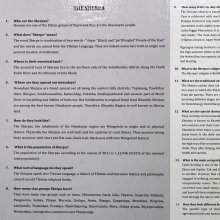Prana, Prāṇā, Prāṇa, Praṇa: 37 definitions
Introduction:
Prana means something in Buddhism, Pali, Hinduism, Sanskrit, Jainism, Prakrit, the history of ancient India, Marathi, Hindi. If you want to know the exact meaning, history, etymology or English translation of this term then check out the descriptions on this page. Add your comment or reference to a book if you want to contribute to this summary article.
Prana has 36 English definitions available.
Images (photo gallery)
Languages of India and abroad
Sanskrit dictionary
[Deutsch Wörterbuch]
Source: Cologne Digital Sanskrit Dictionaries: Böhtlingk and Roth Grosses Petersburger WörterbuchPraṇa (प्रण):—(von 1. pra) adj. ehemalig, alt [Pāṇini’s acht Bücher 5, 4, 30, Vārttika von Kātyāyana. 3.] — Vgl. pratna, purāṇa .
--- OR ---
Prāṇa (प्राण):—
--- OR ---
Prāṇa (प्राण):—2. (von 1. prā) partic. voll [Trikāṇḍaśeṣa 3, 3, 133.] [Hemacandra’s Anekārthasaṃgraha 2, 147. fg.] [Medinīkoṣa ṇ. 21.]
--- OR ---
Prāṇa (प्राण):—1.
3) sarvaprāṇena dhāvatsu rathāśveṣu [Kathāsaritsāgara 54, 5.] — Vgl. yathāprāṇam .
Source: Cologne Digital Sanskrit Dictionaries: Sanskrit-Wörterbuch in kürzerer FassungPraṇa (प्रण):—Adj. ehemalig , alt.
--- OR ---
Prāṇa (प्राण):—1. m. (adj. Comp. f. ā) —
1) Hauch , Athem ; im engsten Sinne die eingeathmete Luft. in weitesten Lebenshauch überh. , Lebensgeist , Lebensorgan ; Pl. Leben (auch Du. , wenn von Zweien die Rede ist). Es werden drei , fünf (gewöhnlich) , sechs , sieben , neun und auch zehn Lebenshauche angenommen. Am Ende eines adj. Comp. wiederzugeben durch dem Jmd oder Etwas wie das Leben lieb ist oder dessen Leben von — abhängt. personificirt als Sohn des Apāna. —
2) Hauch des Windes , Wind. —
3) Athemzug als ein best. Zeitmaass [Āryabhaṭa 3,2.Comm.] zu [Gaṇitādhāya 1,17.] —
4) Starker Athem als Zeichen der Kraft , Kraft überh. sarvaprāṇena mit Anwendung aller Kraft , praṇais mit aller Kraft , von ganzer Seele. —
5) im Sāṃkhya die Seele. —
6) im Vedānta der durch das Gesammtding bedingte Intellect [266,6.] —
7) Pl. Lebenszeichen , Lebensäusserung in übertragener Bed. [Bālarāmāyaṇa 10,13.] —
8) *das Leben in einem Gedicht. —
9) *poetisches Talent , poetische Begeisterung. —
10) Pl. Nase , Mund , Augen und Ohren [Śāṅkhāyana’s Śrautasūtra (Weber) 2,17,1.] [Āpastamba’s Śrautasūtra 12,25,1.] [Gopathabrāhmaṇa 2,1,3,] [Vaitānasūtra 3,13.] [Mānavadharmaśāstra. 4,143.] —
11) ein best. Kalpa , der 6te Tag in der lichten Hälfte von Brahman’s Monat. —
12) *Myrrhe. —
13) mystische Bez. des Lautes ya. —
14) Name eines Sāman [Tāṇḍyabrāhmaṇa 5,4,1.] [Sāmavidhānabrāhmaṇa 1,7,4.] vasiṣṭhasya prāṇāpanau [Ārṣeyabrāhmaṇa] Br , —
15) Beiname Brahman's. —
16) Nomen proprium — a) eines Vasu. — b) eines Sohnes des Vasu Dhara. — c) eines Marut. — d) eines Sohnes des Dhātar. — e) eines Sohnes des Vidhātar. — f) eines Ṛṣi im 2ten Manvantara.
--- OR ---
Prāṇa (प्राण):—2. Adj. voll.
Sanskrit, also spelled संस्कृतम् (saṃskṛtam), is an ancient language of India commonly seen as the grandmother of the Indo-European language family (even English!). Closely allied with Prakrit and Pali, Sanskrit is more exhaustive in both grammar and terms and has the most extensive collection of literature in the world, greatly surpassing its sister-languages Greek and Latin.
See also (Relevant definitions)
Starts with (+462): Praanantak, Praanapan, Prajanana, Prana Vayu Mudra, Prana-dakshinya, Prana-pratishta, Prana-sameta, Pranabadha, Pranabadhe, Pranabh, Pranabhaj, Pranabhaksha, Pranabhaksham, Pranabharana, Pranabhasvant, Pranabhasvat, Pranabhatvat, Pranabhaya, Pranabhisara, Pranabhrit.
Ends with (+51): Alpabalaprana, Alpaprana, Anaprana, Annagataprana, Annamayaprana, Antah-prana, Antahprana, Apetaprana, Apiprana, Aprana, Ardhaprana, Asthigata-prana, Bahih-prana, Bahishprana, Balaprana, Bhuvanaprana, Dashaprana, Dattaprana, Dirghaprana, Gataprana.
Full-text (+816): Pana, Pranapana, Pranayama, Pranabadha, Pranadhinatha, Prananatha, Pranaparigraha, Pranaprada, Pranasadman, Pranaharin, Manjuprana, Pranaharaka, Pancaprana, Vasuprana, Pranarodha, Pranamaya, Jagatprana, Kathaprana, Pranapaharin, Patiprana.
Relevant text
Search found 194 books and stories containing Prana, Prāṇā, Prāṇa, Praṇa, Pra-na, Pra-ṇa, Prāna; (plurals include: Pranas, Prāṇās, Prāṇas, Praṇas, nas, ṇas, Prānas). You can also click to the full overview containing English textual excerpts. Below are direct links for the most relevant articles:
Mundaka Upanishad with Shankara’s Commentary (by S. Sitarama Sastri)
Verse 2.1.8 < [Mundaka II, Khanda I]
Verse 3.1.9 < [Mundaka III, Khanda I]
Verse 2.1.2 < [Mundaka II, Khanda I]
Chandogya Upanishad (Madhva commentary) (by Srisa Chandra Vasu)
First Adhyaya, Second Khanda (14 mantras)
Seventh Adhyaya, Fifteenth through Twenty-sixth Khandas (18 mantras)
Brahma Sutras (Shankara Bhashya) (by Swami Vireshwarananda)
Chapter I, Section I, Adhikarana IX < [Section I]
Chapter II, Section IV, Adhikarana I < [Section IV]
Chapter IV, Section II, Adhikarana III < [Section II]
Kena upanishad (Madhva commentary) (by Srisa Chandra Vasu)
Mantra 1.8 < [Book 1 - Prathama-Khaṇḍa]
Mantra 1.2 < [Book 1 - Prathama-Khaṇḍa]
Mantra 1.1 < [Book 1 - Prathama-Khaṇḍa]
Cidgaganacandrika (study) (by S. Mahalakshmi)
Verse 87 [Śakterādya, Parināma, Prānā] < [Chapter 3 - Third Vimarśa]
Verse 158 [Prāṇā Haṃsa is Prathamaspanda] < [Chapter 3 - Third Vimarśa]
Verse 70 [Pralayāgni] < [Chapter 2 - Second Vimarśa]
Taittiriya Upanishad Bhashya Vartika (by R. Balasubramanian)
Verse 2.282 < [Book 2 - Brahmavallī]
Verse 2.160 < [Book 2 - Brahmavallī]
Verse 3.50 < [Book 3 - Bhṛguvallī]
Related products





